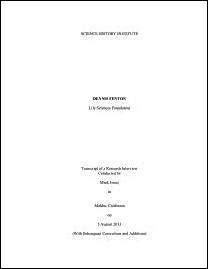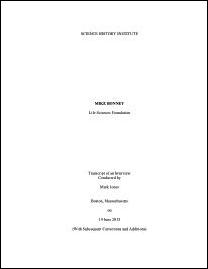
Oral history interview with Thomas Wiggans
- 2015-Apr-27
Oral history interview with Thomas Wiggans
- 2015-Apr-27
Thomas Wiggans grew up in Fredonia, Kansas, a small town with just a few thousand residents. Both his grandfather and father ran a local drugstore, which Wiggans worked in during his adolescence. This led to Wiggans not only having an early interest in becoming a pharmacist but allowed him to learn the ins-and-outs of the profession. He attended the University of Kansas for pharmacy, where he worked summer jobs to support himself. While studying, he was approached by the pharmaceutical company Eli Lilly for a sales position. Wiggans expressed his interest in first pursuing a master’s in business administration; after receiving his MBA from Southern Methodist University, he was hired at Eli Lilly for an entry level marketing position. He was placed in Jacksonville, Florida, where he was a member of a small marketing team with just two other representatives. He was given a multi-month project based out of Indianapolis, Indiana, after which he was promoted to a marketing associate.
Uninterested in continuing at Eli Lilly, Wiggans began entertaining other job opportunities. He interviewed with Serono in Boston, Massachusetts, which focused on fertility technology. The company was new to the United States and Wiggans was hired as the marketing manager to grow the company’s American presence. Wiggans established the company’s sales force at a pivotal time, when fertility technology was booming. The success of the sales force led to Wiggans being promoted to general manager. As the general manager, Wiggans worked with Integrated Genetics to develop recombinant gonadotropins and Celltech Group from recombinant growth hormones. After facing budgeting issues, Wiggans was sent to the United Kingdom, where he worked until he left Serono in 1990.
After leaving Serono, Wiggans was approached by CytoTherapuetics, a cell transplantation company, to join their company. Wiggans accepted the position and returned to Boston, commuting each day to Providence, Rhode Island. He was interested in bringing commercial products to the company, but the board disagreed. This coupled with the difficulty of performing clinical trials pushed Wiggans to seek out other companies. He later received a call from a recruiter with the company Connetics. While accepting the position would mean moving his family across the country to California, he accepted. Connetics’ main product was Relaxin, which was a genetically engineered hormone that they were looking to use to treat scleroderma. While Connetics never developed Relaxin as a treatment for scleroderma, they did shift their focus towards foam dermatology products, which Wiggans recognized as an underserved market. Before the company was sold in 2006, Wiggans helped grow Connetics to four hundred employees and two hundred million dollars in revenue.
Not ready to retire, Wiggans began looking for his next venture. He was invited to join the board of Peplin Operation Pty Ltd., where he was the chairman and then CEO for one year. He also pursued a political career in his home state of Kansas, inspired by his years working to lobby for biotechnology in Washington D.C. After an unsuccessful campaign for governor, Wiggans returned to California, where he was invited by Bay City Capital to look for new opportunities. There, he works as an operational company manager with Gene Bauer, focusing on serving dermatologists. Wiggans has also worked with the Biotechnology Institute and the BioGENEius program, the former of which he helped to make a national program.
| Property | Value |
|---|---|
| Interviewer | |
| Interviewee | |
| Place of interview | |
| Format | |
| Genre | |
| Extent |
|
| Language | |
| Rights | Creative Commons Attribution-NonCommercial-NoDerivatives 4.0 International License |
| Credit line |
|
About the Interviewer
Mark Jones holds a PhD in history, philosophy, and social studies of science from the University of California, San Diego. He is the former director of research at the Life Sciences Foundation and executive editor of LSF Magazine. He has served in numerous academic posts, and is completing the definitive account of the origins of the biotechnology industry, entitled Translating Life, for Harvard University Press.
Institutional location
| Department | |
|---|---|
| Collection | |
| Oral history number | 1051 |
Related Items
Interviewee biographical information
| Born |
|
|---|
Education
| Year | Institution | Degree | Discipline |
|---|---|---|---|
| 1975 | University of Kansas | BSPS | |
| 1976 | Southern Methodist University | MBA |
Professional Experience
Skillern's Drug Store
- 1975 to 1976 Pharmacist
Eli Lilly and Company
- 1976 to 1978 Sales Representative
- 1978 to 1980 Marketing Associate
Serono Laboratories Inc.
- 1980 to 1983 Director of Marketing
- 1985 to 1986 Executive Vice President
Serono Laboratories Inc.
- 1983 to 1985 Vice President, Sales and Marketing
- 1986 to 1991 President and General Manager
Serono Laboratories Ltd.
- 1991 to 1992 Managing Director
Cytotherapeutics
- 1992 to 1994 Chief Operating Officer and Director
Connetics Corporation
- 1994 to 2005 Chief Executive Officer and Director
- 2005 to 2006 Chief Executive Officer and Chairman
Peplin, Inc.
- 2007 to 2009 Chairman of the Board and Chief Executive Officer
Dermira, Inc.
- 2010 to 2020 Co-founder, Chairman, and Chief Executive Officer
Cite as
See our FAQ page to learn how to cite an oral history.
Complete transcript of interview
wiggans_t_1051_final_frf.pdf
The published version of the transcript may diverge from the interview audio due to edits to the transcript made by staff of the Center for Oral History, often at the request of the interviewee, during the transcript review process.









